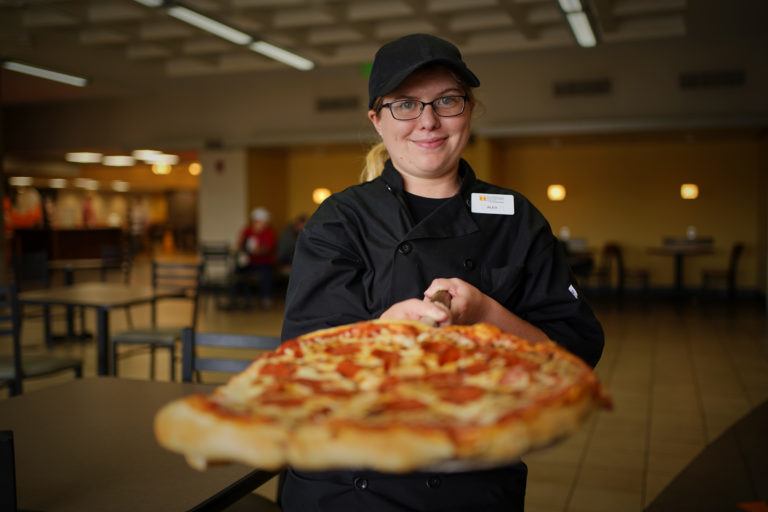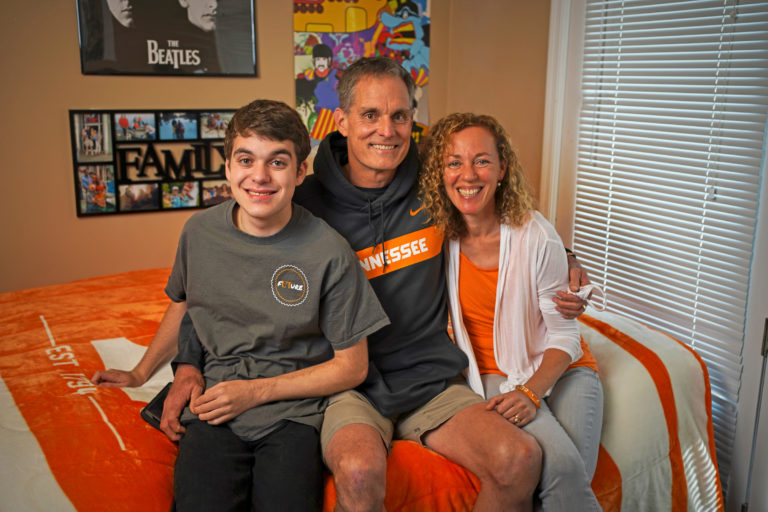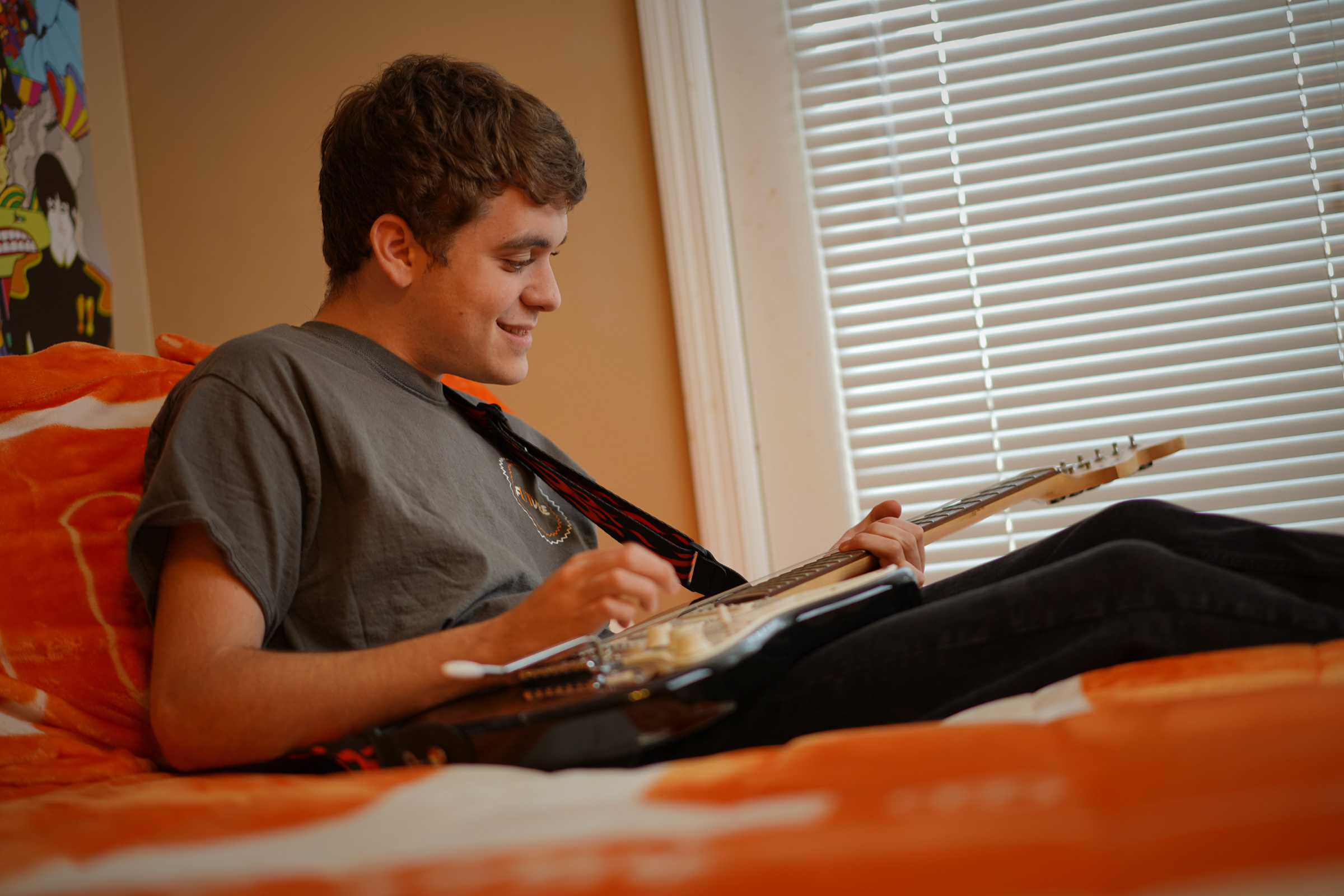By Jennifer Sicking | Photos by Patrick Murphy-Racey
As Alyssa Sasport serves slices of pizza in UT Knoxville’s Presidential Court, she’s figuring out what she wants in life.
It’s the same for Ben Kredich living in an apartment bedecked with Beatles posters.
They’re discovering just what is possible through the UT FUTURE Program, and along the way they’re surprising their parents and even themselves. FUTURE allows students with intellectual and developmental disabilities to attend UT Knoxville and learn to live independently.

Established in 2011 through a federal grant, the program has 21 students for the 2020-21 school year and has a goal to enroll 25 students in 2021-22.
“I think you’ll see that they’re some of the most engaged individuals because they have been given so many barriers and told that they can’t do this, they can’t do that,” says UT FUTURE Director Emma Burgin. “When they’re given the opportunity to do something, they usually come at it full force and with all the enthusiasm that many other college students lack.”
From auditing UT Knoxville classes such as a public speaking, sign language, chorus, history, musicology and food science to attending FUTURE classes such as digital literacy, career and life planning, and life skills, the program prepares its students for life. In auditing the classes, UT FUTURE students still complete homework and take tests, just modified for their abilities. Students participate in internships, such as working at the dining hall, UT System president’s office or printing and mail office. Two years ago, FUTURE began a pilot program allowing the students to live in a residence hall.
“It’s actually the beginning of me being more independent,” Alyssa says.
Ben agrees.
“I’m preparing for independence and job discovery,” he says.
When Ben was young, his mom, Kim Kredich, says she thought he would always live at home.
“Ben just matured, absolutely matured into this experience, through this experience, and we were very persistent in what we knew that we needed to see, which was him living independently,” Kim says.
Ben and his family advocated for FUTURE students to live on campus. “As I begin my third decade, I am excited for opportunities that will help me grow into the best adult I can be. Living in a residential hall at college will teach me skills to live on my own later on,” he wrote in a letter. UT Knoxville then offered to pilot the residential living program.

Each year about 80 UT Knoxville students act as mentors for FUTURE students, helping teach them to clean, cook and launder clothes, as well as being tutors, lunch and workout buddies.
“This is independent living with a safety net,” says April Sasport, Alyssa’s mother. “Her living on campus is more important to me than any class she can take. We’re not just tossing her out into the world. This is getting her prepared.”
From doing chores and working to hanging out with her friends, Alyssa says she knows she has matured through her time in FUTURE.
“Perspective-wise, it’s honestly made me more reliable,” she says.
That’s a step in the program’s overall goal, which is to make UT FUTURE students who graduate with a vocational certificate employable and help them fnd a job that pays at least minimum wage, but preferably $10 per hour. In Tennessee, people with disabilities can be paid far less than their peers because of their disabilities.
“To deny the right to make choices in an effort to protect the person with disabilities from risk is to diminish their human dignity.”
—Robert Perske, advocate for people with intellectual disabilities
“Competitive integrated work is what we say is the ultimate goal, but then I always add increased quality of life,” Burgin says. “I think that getting work that you find valuable and meaningful to you, as well as learning how to be more independent, whether it’s living on campus or just navigating around, all of these things lead to increased independence and social engagement, inclusion for our students.”
And the program is working. With more than 40 graduates, it has averaged an 85 percent employment rate within 90 days of graduation. The national average ranges between 19 and 35 percent.
“You have a dream for usually all your kids that they’re happy, that they live a meaningful life, that they’re safe, they have many positive experiences and also the dignity of risk,” Kim says. “We all look to be supported and challenged. A program like UT FUTURE not only helps the actual people with disabilities live a better life but their families live a better life, and everybody else lives a better life in the university community who has gotten a chance to see that progress within our society.”
Widening the scope of who can attend a university benefits more than just those invited to be a part of UT FUTURE.
“I just think the diversity that my students provide to this campus is just invaluable for the people that they interact with on a daily basis,” Burgin says. “I just think it would be such a shame to not have these students here. I think that they should be on every campus because they just make us think differently, they make us see things differently.”
About UT FUTURE
Just as UT Knoxville students arrive on campus to learn and prepare for a job, so too do UT FUTURE students, who have intellectual and developmental disabilities.
There’s a subset of that population ready to make a jump to independence, and that is who UT FUTURE targets, according to Director Emma Burgin.
“They’re coming to college to be pushed,” says Burgin. “In terms of their independence and what’s expected of them, we have pretty high standards.”
UT FUTURE students undergo a rigorous admissions process. They must graduate from high school and submit an application along with three recommendations regarding their vocational, academic and social lives. Teachers and parents fill out inventories regarding the potential students’ independence level. Then the applicants interview with four different committees, including one made up of current UT FUTURE students. With 21 students during the 2020-21 academic year and a goal of 25 students for 2021-22, not all applicants are admitted.
While the UT FUTURE students audit UT Knoxville classes, an academic support specialist works with course professors to adapt syllabi for all the classes in which the UT FUTURE students enroll to make content and assignments accessible.
While UT FUTURE students can graduate with a vocational certificate after two years, they also can elect to remain up to four years. Burgin hopes in the future it will be a four-year program.
“In my mind asking them to do in two years what college students are doing in four doesn’t really make sense,” she says. “Hopefully, we can get the support to give them the ample amount of time that they deserve.”
Students can qualify for financial aid, much like other students, through filling out the Free Application for Federal Student Aid. In addition to Pell grants, they could receive Tennessee Promise, UT Promise and Step Up scholarships. They also receive support for two years from Vocational Rehab of Tennessee.
“I think it’s really important overall to the university’s diversity and inclusion mission,” Burgin says of the program.



